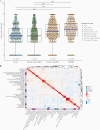Baseline Severe Acute Respiratory Syndrome Viral Load Is Associated With Coronavirus Disease 2019 Severity and Clinical Outcomes: Post Hoc Analyses of a Phase 2/3 Trial
- PMID: 34496013
- PMCID: PMC8522400
- DOI: 10.1093/infdis/jiab445
Baseline Severe Acute Respiratory Syndrome Viral Load Is Associated With Coronavirus Disease 2019 Severity and Clinical Outcomes: Post Hoc Analyses of a Phase 2/3 Trial
Abstract
Background: Elucidating the relationship between severe acute respiratory syndrome coronavirus 2 (SARS-CoV-2) viral load and clinical outcomes is critical for understanding coronavirus disease 2019 (COVID-19).
Methods: The SARS-CoV-2 levels were analyzed by quantitative real-time polymerase chain reaction (RT-qPCR) of nasopharyngeal or oropharyngeal swab specimens collected at baseline, and clinical outcomes were recorded over 60 days from 1362 COVID-19 hospitalized patients enrolled in a multicenter, randomized, placebo-controlled phase 2/3 trial of sarilumab for COVID-19 (ClinicalTrials.gov NCT04315298).
Results: In post hoc analyses, higher baseline viral load, measured by both RT-qPCR cycle threshold and log10 copies/mL, was associated with greater supplemental oxygenation requirements and disease severity at study entry. Higher baseline viral load was associated with higher mortality, lower likelihood of improvement in clinical status and supplemental oxygenation requirements, and lower rates of hospital discharge. Viral load was not impacted by sarilumab treatment over time versus placebo.
Conclusions: These data support viral load as an important determinant of clinical outcomes in hospitalized patients with COVID-19 requiring supplemental oxygen or assisted ventilation.
Keywords: COVID-19; hospital; outcomes; severity; viral load.
© The Author(s) 2021. Published by Oxford University Press for the Infectious Diseases Society of America.
Figures


References
-
- Wölfel R, Corman VM, Guggemos W, et al. . Virological assessment of hospitalized patients with COVID-2019. Nature 2020; 581:465–9. - PubMed
Publication types
MeSH terms
Associated data
Grants and funding
LinkOut - more resources
Full Text Sources
Medical
Miscellaneous

